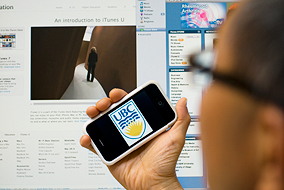
UBC iTunes U, which centralizes and improves access to UBC web content, is part of a strategy to enhance teaching and learning - photo by Martin Dee UBC Reports | Vol. 54 | No. 9 | Sep. 4, 2008
Coming to Your iPod this Fall: UBC Joins iTunes U
By Basil Waugh
UBC-generated audio and video are now just an iTunes download away, thanks to a new partnership between UBC and Apple Inc.
UBC is one of three Canadian universities to join iTunes U, which puts the power of Apple’s popular iTunes platform to work for top global universities. iTunes U enables users to easily search, download, and play its more than 50,000 educational materials, just as they would iTunes’ music, movies, and TV shows.
Lectures by UBC’s Nobel Prize-winning educator Carl Wieman and microfinance guru Muhammed Yunis, a UBC honorary degree recipient, and video messages by UBC student Olympians and Paralympics, are examples of initial offerings at UBC iTunes U (www.itunes.ubc.ca).
In addition to centralizing and improving access to UBC web content, Alfred Hermida of the UBC School of Journalism says UBC iTunes U is part of an ongoing campus-wide strategy to enhance teaching and learning at UBC.
“If you are a student, you probably don’t know how to find UBC web content because it’s spread across university websites,” says Hermida, whose unit contributed initial materials along with the Faculty of Land and Food Systems, Public Affairs and the Office of Learning Technology.
“We know students use iTunes, so this collects what UBC has and takes it to their environment,” says Hermida, who helped to pioneer the British Broadcasting Corporation’s (BBC) news website as a journalist before joining UBC in 2006.
According to Mike Ko, manager of UBC Public Affairs’ web team, UBC iTunes U responds to changing learning trends. “Whether you are a student, an alumnus or a lifelong learner, people want to download information and consume it when convenient on their computers, portable mp3 players and cell phones,” he says.
For example, Hermida says, a student can listen to course materials on an iPod at the gym. An alumnus can watch a sold-out campus event on an iPhone during their morning commute. “You could be learning as you walk down the street,” he says.
Hermida says iTunes U has the potential to enhance teaching. “Studies show that online content can help to improve the educational experience, but it depends on how you use it. Joining this initiative puts UBC professors at the forefront of new teaching methods,” he says, noting that resources, including best practices, will be available to instructors.
Digital Life
Here is a quick look at new teaching and learning technologies at UBC this fall.
Digital Storytelling
Last year, Land and Food Systems (LFS) Prof. Cathleen Nichols asked students to create short digital stories of their class experiences. The results were compelling tales of triumphs and challenges. “Students said it enhanced their education and overall experience just to take that time to reflect on what they learned and how they’ve grown,” says Duncan McHugh of the LFS Learning Centre. “It is also a crash course in multimedia literacy, with students learning such software as iMovie and Audacity.”
To see a digital story, visit: http://blogs.landfood.ubc.ca/learningcentre/2008/05/02/digital-stories/.
Citizen Journalism
LFS students are partnering with UBC School of Journalism and the Now Public citizen journalism organization to tackle hot button issues through podcasts and blogs. “Our students want to engage with the public on issues; this program helps to give them the communications skills,” says McHugh. “Many of our students tend go on to work with the public through NGOs and other organizations, so it’s important for them to have experience in these public forums.”
Class Blogging
UBC’s most ambitious blog project this year will see an entire cohort of 100 students in the LFS Global Resources System (GRS) Program create their own blogs. Many will be studying food security through international placements and exchanges, and this project is designed to help them stay in touch. “The goal is to connect GRS students, alumni and staff from all over the world,” says recent LFS graduate Mary Ann Keeting, who is helping to lead the project. “It is a way to keep a professional record of your experiences, and connect with family, friends and the public.”
To see Keeting’s blog, which details her experiences in Zambia and Kenya, visit: http://blogs.landfood.ubc.ca/maryann.
Geo-location
If you are looking for healthy food options in Vancouver neighborhoods, visit a Google Map created by LFS students. “Students are using geo-location – digitally tagging locations in Google Maps or with global positioning systems (GPS) – to enhance their research,” says McHugh. “It really helps people to visualize what you are doing.”
To see a Google Map tagged by UBC students, visit: http://tinyurl.com/agsc250foodmap. |
